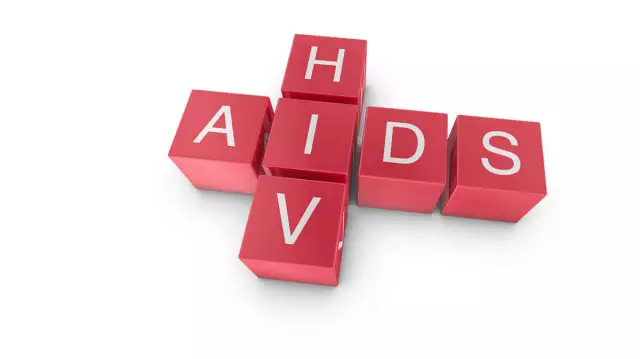- Author Rachel Wainwright wainwright@abchealthonline.com.
- Public 2023-12-15 07:39.
- Last modified 2025-11-02 20:14.
HIV infection and AIDS: what's the difference?

The Human Immunodeficiency Virus, or HIV for short, is currently the leader among infections in terms of rumors, fears and mysteries. Some called it the plague of the twentieth century, and predicted the extinction of mankind because of it, others consider it a hoax, part of a conspiracy theory played out with some unseemly purpose by some secret forces. What exactly are HIV infection and AIDS? We will try to figure it out based solely on medical facts.
HIV is a retrovirus that normally circulates in animals without posing a serious threat to humans. However, it was this virus that mutated for some unknown reason, changing its usual properties. The route of infection with this virus is parenteral, which means through the blood. It is not known how the first contact between an infected animal and a person took place, but it is known that this person was not very well-behaved, and transmitted the virus to a large number of people sexually. These people, in turn, carried it around the world. HIV infection and AIDS differ in the same way that the flu virus differs from the flu itself. HIV infection is the pathogen, AIDS is the disease that this pathogen causes.
In medicine, there is such a concept - virus carrier. A virus carrier is a person whose immune system was not strong enough to reject the virus without letting it into the body, but strong enough to prevent it from developing there. In this case, the virus circulates in the blood without causing disease. Under favorable circumstances, a person may not get sick for an arbitrarily long time, even all his life - while remaining a virus carrier and a spread of infection. However, under unfavorable circumstances, the immune system will weaken, and the virus is activated. In this case, a disease develops - acquired immunodeficiency syndrome, or AIDS.

Why are HIV and AIDS dangerous? They weaken the immune system. Carriage of viruses to a lesser extent, disease to a greater extent. Immunodeficiency is a lack of the body's defenses. The human immunodeficiency virus infects cells of the immune system, lymphocytes, as a result of which the body remains defenseless against any infection - bacteria, even opportunistic, fungi, other viruses that destroy it sooner or later. HIV is diagnosed indirectly, by the antibodies produced to it, the virus itself has not yet been detected. As for treatment, there are currently no drugs that can cure AIDS, but there are drugs that can help keep HIV inactive, which is why control and treatment are imperative when a virus is detected.
Found a mistake in the text? Select it and press Ctrl + Enter.






